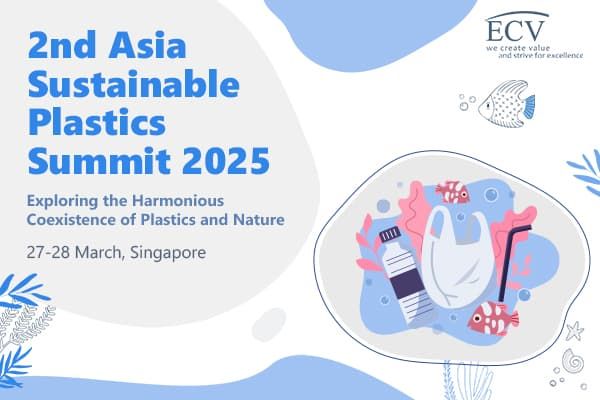 Completed
Completed
Asia Sustainable Plastics Summit 2025
Organizer:
ECV International
Duration:
Mar 27 - 28, 2025
Venue:
Singapore
Location:
Singapore
Contact Person:
WES WEI
Email:
Telephone:
+86 21 8026 0707-813
Website:
Industry Focus:
Product Focus:
Partial Confirmed Topics
➤ Plastics circularity: Outlook for Asia
➤ Polyester Textile to Textile Waste Recycling – A journey
➤ Recycling the Unrecyclable: The Power of Enzymes to Infinitely Recycle Plastics without Hurting the Planet
➤ Perspectives on Combating Plastic Pollution and Shaping a Circular Plastic Economy across Industry, Policy, and Finance
➤ Panel Discussion 1: Plastic Circular Economy in Supporting Sustainable Development and Environmental Protection in Asia
➤ Panel Discussion 2: Navigating the Transition from Petro-based to Bio-based
➤ Carbon Management Technology - a Win-Win in Reducing Carbon Emissions and Achieving Sustainable Development
➤ Twin-screw Extrusion in Plastics Recycling: From Post-consumer Compounds to Chemical Conversion
...
➤ Plastics circularity: Outlook for Asia
➤ Polyester Textile to Textile Waste Recycling – A journey
➤ Recycling the Unrecyclable: The Power of Enzymes to Infinitely Recycle Plastics without Hurting the Planet
➤ Perspectives on Combating Plastic Pollution and Shaping a Circular Plastic Economy across Industry, Policy, and Finance
➤ Panel Discussion 1: Plastic Circular Economy in Supporting Sustainable Development and Environmental Protection in Asia
➤ Panel Discussion 2: Navigating the Transition from Petro-based to Bio-based
➤ Carbon Management Technology - a Win-Win in Reducing Carbon Emissions and Achieving Sustainable Development
➤ Twin-screw Extrusion in Plastics Recycling: From Post-consumer Compounds to Chemical Conversion
...
Introduction:
Since the last century, the production of plastics has grown faster than any other material. Plastic′s low cost, durability, and lightweight make it play a vital role in a wide range of industries including automotive, packaging, medical, electronics, and textiles etc., According to official figures from the United Nations Environment Programme (UNEP), global primary plastics production is expected to reach 1.1 billion tons by 2050.
However, the resistance of plastics to degradation also makes it difficult for them to completely degrade naturally, which will inevitably generate a large amount of plastic waste and even microplastic waste. To date, less than 10% of the 7 billion tons of plastic waste produced globally has been recycled. Plastic pollution is a global problem that not only affects human health, but also directly damages ecosystems and hinders sustainable development. Industries across the plastics value chain need to confront and solve this issue jointly.
In addition to focusing on the plastics cycle, the 2nd Asia Sustainable Plastics Summit 2025 (ASPS 2025) also turns attention to bio-based, biodegradable, and digitalized plastic manufacturing. Bio-based plastics are part of the circular economy, with a lower carbon footprint and superior material performance compared to fossil-based plastics. The biodegradable and digital plastics production industry is also undergoing significant advancements and reforms as global awareness of environmental sustainability grows. This is also an innovation of this Sustainable Plastics Summit, which aims to connect more industries in the plastics chain through new directions to address plastic pollution and realize a sustainable future.
However, the resistance of plastics to degradation also makes it difficult for them to completely degrade naturally, which will inevitably generate a large amount of plastic waste and even microplastic waste. To date, less than 10% of the 7 billion tons of plastic waste produced globally has been recycled. Plastic pollution is a global problem that not only affects human health, but also directly damages ecosystems and hinders sustainable development. Industries across the plastics value chain need to confront and solve this issue jointly.
In addition to focusing on the plastics cycle, the 2nd Asia Sustainable Plastics Summit 2025 (ASPS 2025) also turns attention to bio-based, biodegradable, and digitalized plastic manufacturing. Bio-based plastics are part of the circular economy, with a lower carbon footprint and superior material performance compared to fossil-based plastics. The biodegradable and digital plastics production industry is also undergoing significant advancements and reforms as global awareness of environmental sustainability grows. This is also an innovation of this Sustainable Plastics Summit, which aims to connect more industries in the plastics chain through new directions to address plastic pollution and realize a sustainable future.